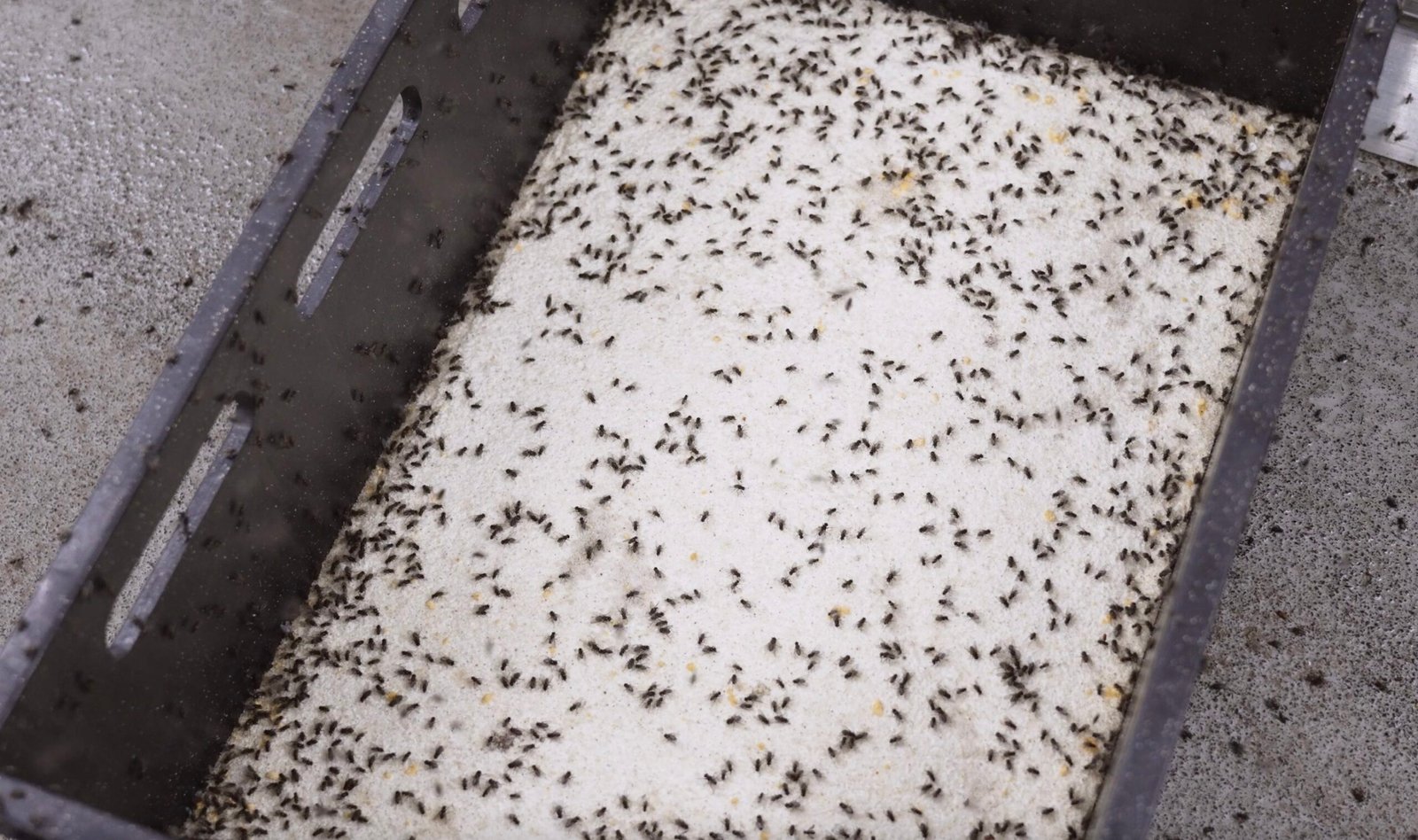The waste management company UAB Energesman, responsible for handling household and food waste in the Vilnius region, has begun testing fly larvae farming. The Dutch-manufactured fly larvae equipment, worth EUR 1 million, is the first of its kind globally, specifically designed for processing household food waste. Additionally, UAB VAATC invested EUR 1.1 million in automated systems for processing orange waste bags.
Trials underway
“The equipment has been installed, and we have started testing. Initially, we conducted trials using plastic pellets, but now we are testing the system with live fly larvae. We are assessing the entire cycle – from breeding flies in a dedicated container to a specialised tank for collecting eggs, where larvae hatch. We are also testing the orange bag unpacking machine, which produces clean organic matter from food waste to feed the larvae,” explains Algirdas Blazgys, CEO of Energesman.
The flies are housed in a specially designed 35-square-metre container located at the Vilnius Mechanical-Biological Waste Sorting Plant, operated by Energesman and owned by the Vilnius Regional Waste Management Centre (VAATC).
Connected to the fly container is a specialised egg-laying unit that creates optimal conditions for flies to lay their eggs.
“In the fly habitat, the lights automatically switch off every 3 – 4 hours, while the egg-laying unit is illuminated. This attracts the flies to lay their eggs. Later, the lights are reversed to guide the flies back to their living container,” explains Walter Jansen, CEO of Amusca BV and the Dutch scientist who developed and perfected the fly larvae technology.
The eggs are then transferred to a specialised larvae incubation tank, where, within just 3 – 4 days, 100 kg of eggs can grow into up to 3,000 kg of larvae. In this tank, the larvae are fed food waste from Vilnius residents, processed and cleaned by the orange bag unpacking system.
When the larvae mature, they automatically move to a separator, where they go through several screening cycles to separate them from residues and by-products generated during growth. Energesman invested EUR 1 million in this fly larvae farming equipment.
First globally
In addition to the fly and larvae farming equipment, the system includes an orange bag unpacking machine (depacker) and a sedimentation tank (seditank) that automatically prepare the larvae feed and separate impurities. VAATC invested EUR 1.1 million in this equipment.
The unpacking machine shreds food waste along with the orange bags and mixes the resulting mass with water. During the next stage, lightweight plastics float to the surface and are removed using an air vortex. Heavier impurities, such as glass shards, small stones, or metal particles, settle at the bottom and are also separated. The middle layer retains a liquid organic mass with 99% purity, which serves as larvae feed.
“This is the only equipment of its kind in Lithuania capable of producing such pure organic mass from household food waste, which typically contains various impurities like plastic packaging, glass, metal containers, sponges, and wipes,” says Tomas Vaitkevicius, Director of the Vilnius Regional Waste Management Centre (VAATC).
The clean organic mass produced by the modern unpacking machine and sedimentation tank can also be used in biogas plants for biomethane production.
According to T. Vaitkevicius, the fly larvae farming technology being implemented at the plant is innovative and new, so the operator still faces a long journey to optimise production processes and find markets for the products.
“We aim to be the first region in the world where household food waste is processed using fly larvae – all the necessary equipment is in Vilnius, and the first trials are yielding positive results,” states A. Blazgys.
Encouraging food waste sorting to support larvae farming
“Together with Vilnius region residents, we are creating a success story. Therefore, I encourage everyone who has not yet started sorting food waste to begin doing so and contribute to larvae farming,” urges A. Blazgys.
According to him, studies show that since the introduction of food waste sorting last year, Vilnius region residents have been disposing of increasingly cleaner waste, as more households separate food scraps into dedicated orange bags. This makes it easier to prepare other waste for recycling.
T. Vaitkevicius emphasises that this modern approach to food waste management will create significant added value, help reduce the use of fossil resources, decrease reliance on imported protein crops, and contribute to the development of the green economy in Vilnius and across the country.
“We have adopted advanced technology that will positively impact the circular economy in Lithuania, as food waste can be reintroduced to the market as new products for industrial use,” says A. Blazgys.
The industrial larvae farming project is currently under development, and it is expected to start operating on a larger scale this spring.
The Vilnius Mechanical-Biological Waste Treatment Plant, operated by Energesman, sorts mixed municipal and food waste from the entire Vilnius region, which includes eight municipalities: Vilnius city, and the districts of Vilnius, Trakai, Elektrenai, Ukmerge, Svencionys, Salcininkai, and Sirvintos. The plant processes approximately 220,000 tonnes of waste annually.

